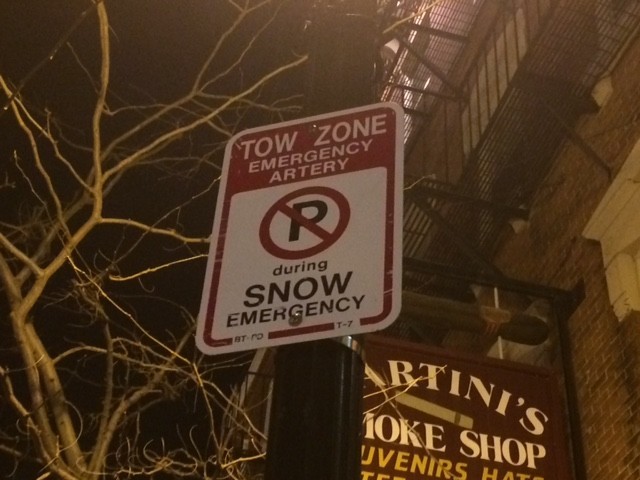
With mountains of snow guarding street spaces and curbsides, Boston is in need of available parking spaces perhaps now more than ever. In times like these creative, next-generation solutions around an already struggling parking scene would be welcome by Bostonians with open arms. Unfortunately, they won’t have the help of a government funded parking study.
As part of Gov. Baker’s spending cuts to help offset the Commonwealth’s budget deficit, the governor has slashed a line item from the economic development package approved last year by his predecessor Deval Patrick.
The study would’ve examined demand-based parking solutions for cities that see a daily visitor population increase of 30,000 people.
Dominick Ianno, communications director for the Executive Office for Administration and Finance, told BostInno that Gov. Patrick had diminished funding for the project from $1 million to $200,000, at which point Gov. Baker did away with it entirely.
According to Ianno, the language added by the Legislature of the study was as follows:
For grants for the study and implementation of parking management plans in municipalities that, due to residential, commercial or industrial development, require the development of demand-based parking to meet the needs of visitors to the municipality whether they be employees, customers of businesses or tourists; provided, that municipalities that demonstrate an average daily visitor population or at least 30,000 shall be given priority grants up to $100,000.
Particularly in Boston, a variety of parking startups and apps emerged in 2014 when it became clear that entrepreneurs could capitalize on the untapped market and people simply reached their threshold when it came to the frustrations that accompany searching for a vacant space in the city.
Parking garage payments quickly add up and repeatedly having to feed a parking meter every two hours or so is inefficient and bothersome.
So residents took it upon themselves to find a fix.
That’s not to say the city is sitting idly by as they watch people try and devise a remedy to the perpetual problem. City Hall put a stop to Haystack when they felt the Baltimore company was trying to profiteer off city-owned spaces, and went on to fluctuate maximum parking hours in the Seaport to try and make traffic caused by parking space searchers flow quicker.
And Mayor Walsh has shown he’s able to think outside the box, evidenced by the redirection of two-way South Boston streets into one-way only so residents can navigate roads made narrow by towering snowbanks.
The real trailblazers have been in the private sector, where apps like SPOT, SpotLight, SpotHero, Veer and Zwayo are creating real-time on-demand practices to keep parking flowing.
But, of course, they’re able to devote their own time, money and resources to the cause.
“We feel strongly, at SPOT, that parking is one of these hard pressed issues that won’t see any improvement unless we devote substantial resources to understanding the problem and then resolving it via a few different routes,” SPOT founder and CEO Braden Golub told BostInno. “We know for a fact that parking can either incentivize or prohibit individuals from coming into our city and we won’t sleep until we put a solution in front of every one of these individuals which will end up incentivizing them to drive into Boston and park easier.”
Gov. Baker recently criticized the MBTA for its inability to cater to the needs of Boston commuters during tumultuous weather. The entire system, though, is a victim of inadequate funding and debt taken on by the infamously over budget Big Dig which MBTA GM Beverly Scott, who resigned shortly after Baker’s blast, made all too clear.
It’ll be interesting to see if Gov. Baker and Mayor Walsh each make further strides in the realm of parking. If nothing else, the recent inclement weather has exemplified one area where the dexterity and adaptability of Boston’s parking may have come in handy.
Both have expressed a desire to work cooperatively with startups and entrepreneurs on this matter but, as the weather shows, timeliness could be more of a factor than originally thought.

